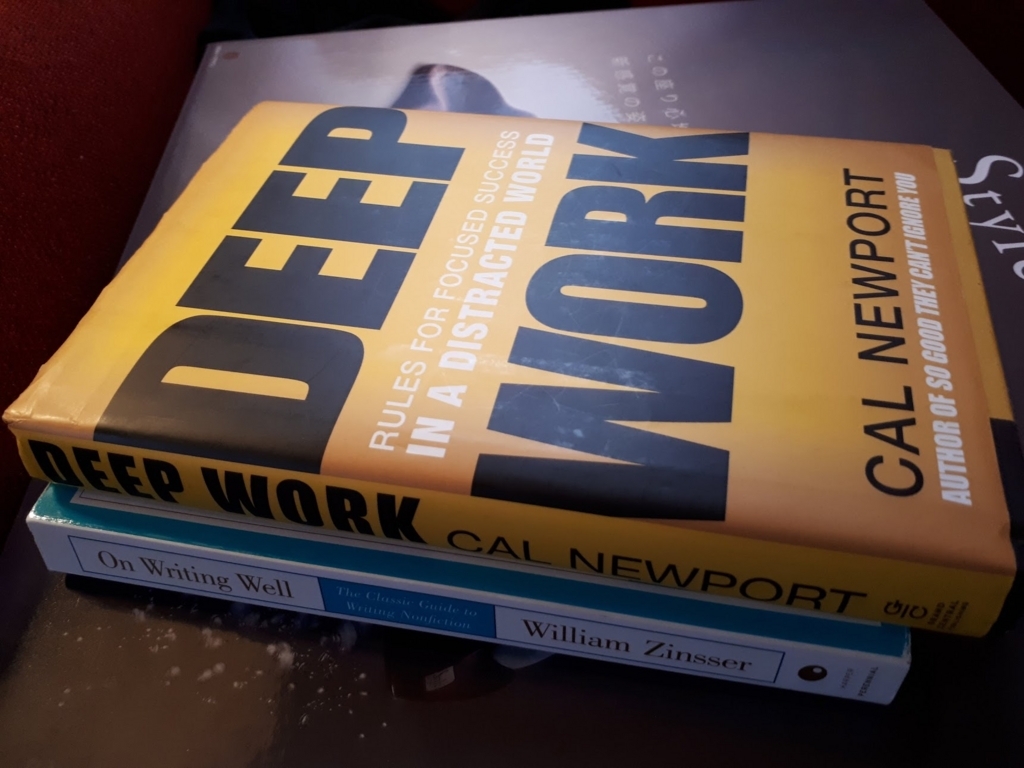
The two books I brought to Japan. Deep Work and On Writing Well.
Hi! My name is Hugo Zapata. I'm a Software Engineer from Colombia. A few months ago I read an article related to the book "Deep Work" from Cal Newport. The article got my attention so I bought a copy of the book and put it in my suitcase while preparing to travel to Tokyo. I've always been interested in how to manage my cognitive resources and Deep work goes deep on this topic in a very eloquent way. Below are some of the points I consider important about the book. Not only for company related work but also for personal projects, like writing a book, create art or learning a new skill.
This is a book backed by scientific studies in different fields and based on the work of people doing research in psychology and other fields related to human behavior.
The importance of Depth and the dangers of distraction
An interesting point Calport makes is that deep and engaged work is required for a happy life. Frequent distractions, on the other hand, are a source of anxiety and will sabotage our efforts to master a skill or learn something new. Some good points are also made about the importance of learning hard things, and how that's a competitive advantage nowadays.
What's your cognitive limit?
Newport cites studies about the concentration limits of the human brain. Deep thinking and deep work are crucial, but it's not possible to do them for long periods. I think is important to know our limits. Also, frequent distractions can drain our mental energy really quickly so we have to be careful about them.
“Ericsson notes that for a novice, somewhere around an hour a day of intense concentration seems to be a limit, while for experts this number can expand to as many as four hours—but rarely more.” Cal Newport
There are many examples, from top performant athletes, writers, and programmers who have achieved important goals, even some breakthroughs that have changed the world. It's very interesting to take a look at their habits. It's not that they work long hours but that they are very methodic on the way they approach their work and interruptions.
Boredom and idleness are important
It is only ideas gained from walking that have any worth. Nietzsche
Another point worth mentioning is the value of "doing nothing" as a necessary step to benefit from deep focus sessions. Going for a walk, listening to music, taking a nap and other "recharging" activities are important. Famous writers and scientists have praised the value of rest and some important breakthroughs came from those idle times.

Idle times are essential to the creative process, make sure to include them in your daily schedule! ( Photo by Lance Anderson on Unsplash )
Some of the cited studies done by psychologists have interesting results. There's one with two groups of people who perform a difficult task under difficult circumstances. Both groups are given a test and have to displace to another location. Group n.1 is required to take a specific path surrounded by nature. The other group is given the same task but for them, the path is surrounded by obstacles in a busy street. Both groups take the test but the first group gets better scores on average. The explanation for this is that by constantly having to focus on potential dangers we deplete our concentration and it will have an impact on the outcome of our work. That's very interesting, even the small details in our daily routine have a big impact on our ability to focus deeply.
Different ways to do Deep work. Whats yours?
Because of the diverse nature of people, and different tolerance to distraction there are multiple ways to reap the benefits of deep work. This also depends on the perceived importance of the work one is doing. Newport mentions some:
The monastic approach:
Radically minimizing distractions and avoiding every kind of work except the deep one. (Example Donald Knuth who deleted his email account years ago and has an assistant who filters his mail he receives so he can focus on his mission )
Bimodal approach:
Have some fixed periods of isolation to work in a very focused way ( For example, taking a full day/week to write ). Useful for people can't completely remove themselves from the world for long periods but still have the flexibility to do small retreats.

Looks like a nice place to retreat to write a novel. Photo by Cassie Boca on Unsplash
Rhythmic approach:
Dedicate a period every day to deep work. Won't be as focused as other approaches but fits well with most people routines.
Journalistic:
Switch to deep work whenever you can ( Not easy but useful for people that have a very dynamic schedule, requires training to switch contexts easily)
Make grand gestures
A curious strategy to create time and space for deep work is called "make grand gestures" it consists in doing a radical change temporary as a ritual to fight the resistance of starting (or finishing) something that's important to you. An example Newport presents is about J.K. Rowling ( Harry Potter series author ) having a difficult time trying to finish one of her books. Her grand gesture? Rent a luxurious traditional hotel room for her to work from there. This change of environment gave her the inspiration to finish the book.
I've personally tested this method by booking flights to one of my favorite cities in the world (Medellín - Colombia ) just to work on something that matters to me or to study a hard topic I'm interested in. I can confirm it's an effective method!
What grand gesture can you do to finish ( or start ) that project that's been on the back of your mind?
Final thoughts
Overall it was a very interesting book and I recommend it, no matter what type of work you do. Distractions are abundant and to achieve our personal goals we need to be aware of our routines and manage our cognitive resources in a good way. Implementing some of the strategies can impact ( in a positive manner ) the way we approach our daily challenges and long-term goals.